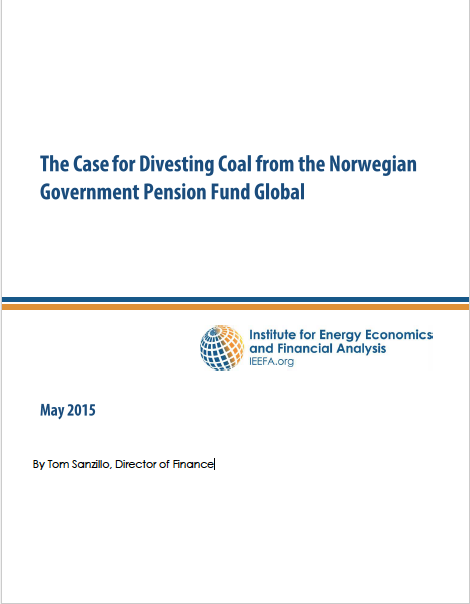Coal Industry Arguably ‘Poorest-Performing Sector’ in Global Economy: New IEEFA Analysis

CLEVELAND, May 18, 2015 (IEEFA.org) — The Institute for Energy Economics and Financial Analysis (IEEFA) today urged the Norwegian Government Pension Fund Global (GPFG) to reduce its exposure to fossil-fuel risk by divesting more of its coal-related holdings.
A new IEEFA report, “The Case for Divesting Coal from the Norwegian Government Pension Fund Global,” presents a grim outlook for the coal industry and says prudent investors will steer clear of coal holdings now and for the foreseeable future.
The report notes that coal-company stock prices have collapsed in recent years and that the stocks of coal-burning utilities are in decline too. It points out that over the past five years, the Stowe Global Coal Index has lost 71 percent of its value, and that while coal will remain part of the global industrial energy mix, its share of that mix will continue to fall over time.
The report notes also that the Norwegian Pension Fund includes Germany’s RWE AG among its top utility holdings although the company derives 61 percent of its energy production from coal and is one of the poorest performers on the GPFG utility list (RWE AG’s market capitalization has plummeted from EUR50 billion in 2007 to EUR13.8 billion today).
The report, by IEEFA Director of Finance Tom Sanzillo, offers core guidelines for GPFG divestment and says the Fund should build promptly on its earlier divestment of “pure-play” coal companies by divesting utilities and companies that rely on coal for more than 20 percent of their activity.
“The coal industry is arguably the poorest-performing sector in today’s global economy and is in a state of structural decline,” Sanzillo said. “It is a shrinking industry with little upside potential. Normal cyclical recoveries that have seen coal stocks and coal demand rebound in the past are most likely a thing of the past. Coal faces new market competition, new concerns over climate and air pollution leading to more restrictive policies, and new waves of public opposition. The high level of risk for both coal-mining and coal-burning companies suggests weak long-term performance and is best avoided altogether.”
GPFG is the largest pension fund in the world. Its total coal sector holdings are valued at NOK 85.5 billion (US$11.4 billion). Norges Bank Investment Management, an arm of the Norwegian Central Bank, manages the Fund for the Norwegian Ministry of Finance.
The IEEFA report recommends the following:
- A “clear, effective and achievable” divestment mandate by the Norwegian Parliament (Stortinget) to be implemented by Fund managers.
- Full divestment of companies with more than 20 percent of their production in coal or that mine more than 50 million tons of coal per year.
- Full divestment of utilities and power-generation companies that get more than 20 percent of their generation capacity mix from coal-fired power plants.
Sanzillo said weakening global coal markets continue to be hobbled by broader adoption of energy efficiency and by competing forms of energy including natural gas, solar, and wind-powered generation, and that coal-industry investors will suffer as a result.
The report also says that, although an Expert Group appointed by the Ministry of Finance recommended a strategy of “company engagement” rather than divestment “a process of mere engagement will be futile.” The report cites the coal industry’s history of intransigence in dealing with environmental and climate change initiatives, and says it has rebuffed a series of shareholder engagement initiatives on climate change in the U.S.
In addition, IEEFA says the coal industry has refused to innovate in the face of changing energy markets. Even though it won an important legislative victory in the U.S. in 2010 by defeating climate change legislation, “the industry victory did nothing to stem the downward spiral of coal company financial fortunes.”
While the report notes that GPFG’s history of socially responsible investing would be in line with a coal divestment policy, it emphasizes the financial risks associated with the Fund’s coal holdings.
“GPFG would demonstrate its commitments to both social responsibility and its fiduciary duties by following these recommendations,” the report concludes.
Media contact:
Karl Cates
[email protected]
917.439-8225
Director of Finance Tom Sanzillo is available for interview. Mr. Sanzillo has 30 years of experience in public and private finance, including as a first deputy comptroller of New York State, where he held oversight over a $156 billion pension fund and $200 billion in municipal bond programs.
About IEEFA
The Institute for Energy Economics and Financial Analysis (IEEFA) conducts research and analyses on financial and economic issues related to energy and the environment. The Institute’s mission is to accelerate the transition to a diverse, sustainable and profitable energy economy and to reduce dependence on coal and other non-renewable energy resources.













